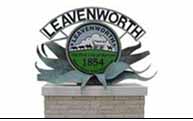
Continue north
on Broadway to Delaware Street take a right and then immediately
on the right hand side is The First City Museum, 743 Delaware,
that currently houses a 1913 C.W. Parker Carousel in the process
of restoration. There is also what is thought to be the oldest
primitive carousel on display, as well as a mock-up of the Federal
Penitentiary, prison memorabilia and other frontier memorabilia
and artifacts. The museum is open Thursdays & Fridays Noon
- 4:00 p.m., and Saturdays 10:00 a.m. - 2:00 p.m.

Travel to
Fifth Street where on the Northwest corner is the Performing Arts
Center, which was once a movie house. This building is listed
on the State Register of National Historic places and is currently
the home of the River City Community Players, a group that produces
theatrical events throughout the year.

One block
north on Fifth Street is City Hall. This building was built in
1924 on the same site as the original City Hall, which dated from
the territorial days. On the lawn is a replica of the Statue of
Liberty, placed and dedicated by the Boys Scouts in 1950. Near
its base the City's time capsule was buried during the nation's
bicentennial celebration. It is scheduled to be unearthed in July
2076.

At Fourth
and Delaware, southwest corner, is the Mid America Bank &
Trust Co. This was once the location of the opera house, know
as Stockton Hall where, in December, 1859, Abraham Lincoln delivered
an address.

Across the
street, on the northwest corner, was the location of the headquarters
of Russell, Majors and Waddell, one of the largest overland freight
companies in western history. In 1855 it won the government contract
for hauling supplies to western forts and to the troops in the
field. One of its early employees was William F. "Buffalo
Bill" Cody, who began working when he was about 12 or 13
years old. (The Cody farm was north of the fort in Salt Creek
Valley.) Later Cody transferred to the company's branch enterprise
in St. Joseph, the Pony Express.

Continue east
on Delaware to the two blocks nearest the Missouri River. This
two-block area was the center of economic activity from 1854 to
1870. It is called the Leavenworth Landing, where thousands of
tons of supplies were once unloaded from the river boats. Pioneers
by the thousands came to Leavenworth by boat to buy their wagons
and stock from local merchants before heading west.

The row of
brick buildings on Delaware between Second and Third Streets is
a splendid example of the city's effort to preserve its past while
catering to the present.



